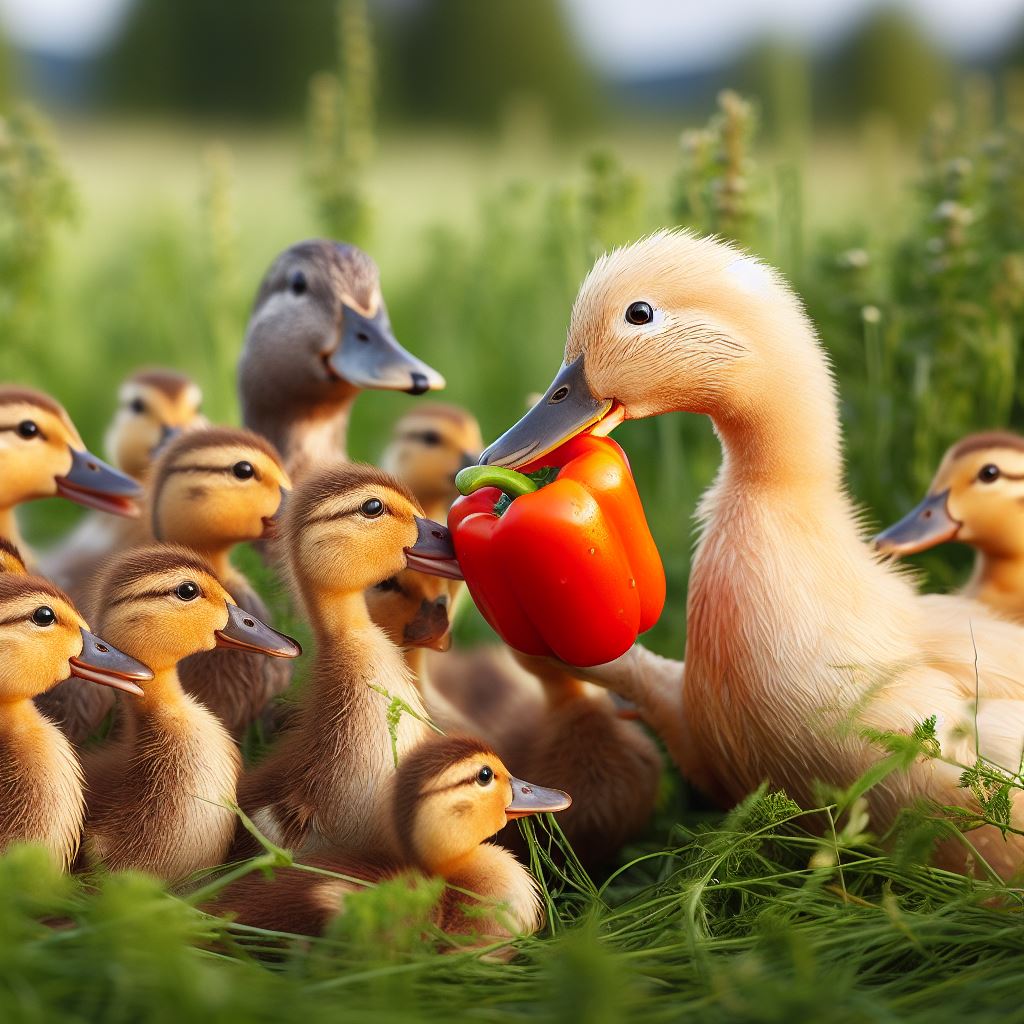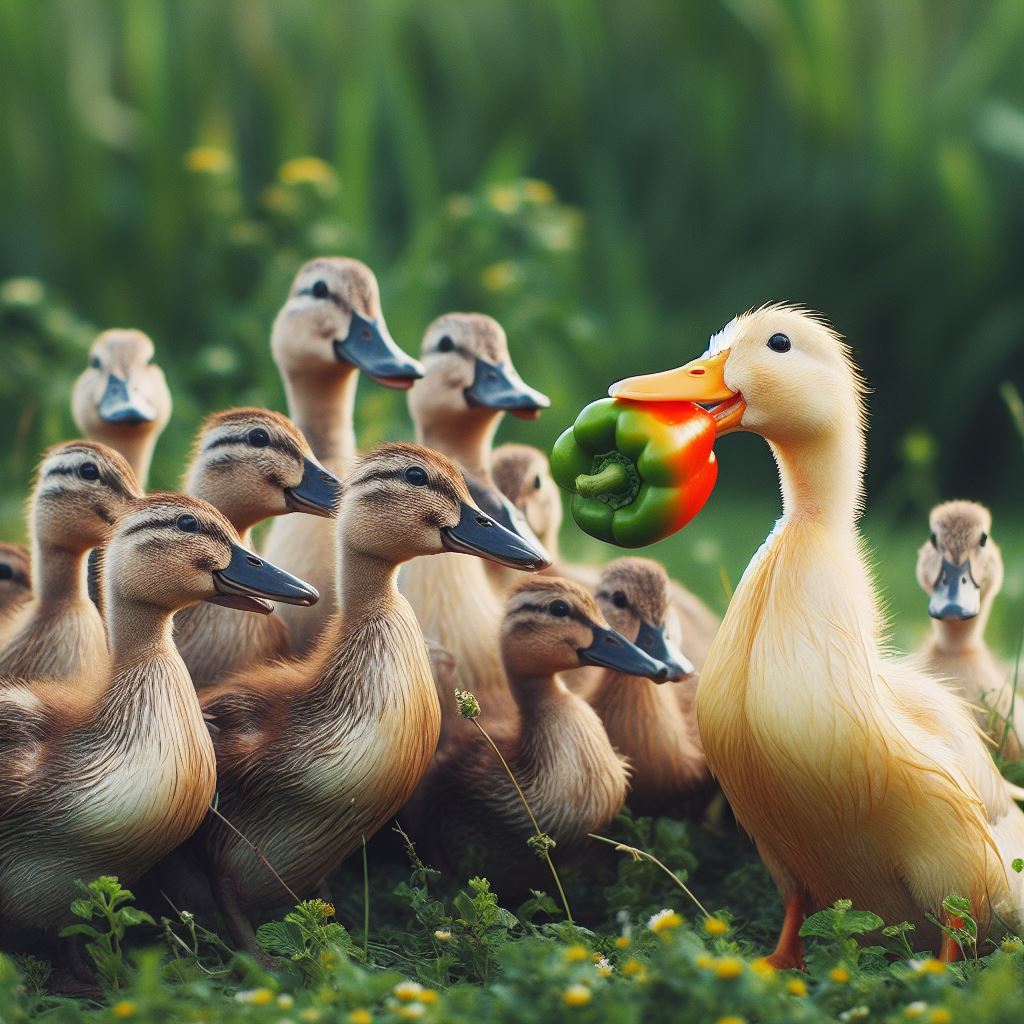Yes, ducks can eat bell peppers.
I recommend feeding bell peppers to ducks in moderation as part of a balanced diet.Bell peppers are a nutritious vegetable that are safe for ducks to eat.
They contain vitamin C, vitamin A, and other antioxidants.
Bell peppers also provide some fiber.
This makes them a healthy supplement to a duck’s typical diet.However, bell peppers are part of the nightshade vegetable family.
Nightshade vegetables contain glycoalkaloids that can cause digestive upset if consumed in excess.
For this reason, bell peppers should only make up a small part of a duck’s diet.
No more than 10% of their daily food intake.When preparing bell peppers for your ducks, be sure to wash them thoroughly and chop them into bite-sized pieces.
It’s also best to avoid feeding ducks the pepper tops or seeds as they are difficult to digest.
Stick to the bell pepper flesh instead.In the end, bell peppers make a nutritious occasional treat for ducks.
Just be sure not to overfeed them.
I recommend consulting your veterinarian if you have any concerns about incorporating new foods like bell peppers into your ducks’ diets.

- What specific nutrients do bell peppers provide that would benefit ducks? Knowing the vitamin, mineral, and antioxidant content could help assess if they're a useful addition to a duck's diet.
- Are there differences in how well ducklings versus adult ducks can digest bell peppers? Their digestive systems mature at different rates, so bell peppers may need to be prepared differently.
- Could eating bell peppers cause any digestive issues for ducks, like diarrhea or upset stomach? Since they're part of the nightshade family, do they contain any compounds that could irritate a duck's system?
- What's the best way to prepare bell peppers to feed ducks - raw, cooked, or freeze-dried? Would removal of seeds and membranes change how easily they can eat and digest them?
- Are conventionally-grown bell peppers safe for ducks, or is it better to only feed them organic peppers? Do pesticide residues accumulate in ducks' tissues over time?
- How often and how many bell pepper pieces are safe to feed a duck per day or week?
What specific nutrients do bell peppers provide that would benefit ducks?Knowing the vitamin, mineral, and antioxidant content could help assess if they’re a useful addition to a duck’s diet.
Firstly, bell peppers are packed with vitamin C – much more than oranges!
This powerful antioxidant boosts the immune system, helping ducks fight infections and prevent disease.
Vitamin C also enables iron absorption, which is crucial as ducks are prone to anemia.Additionally, bell peppers contain impressive levels of vitamin A from beta-carotene.
This vitamin supports healthy eyesight, growth, reproduction, and egg production in ducks.
The vitamin E in bell peppers has antioxidant effects to protect cells, while B-vitamins aid energy metabolism.Mineral-wise, bell peppers provide useful amounts of potassium, magnesium, and manganese too.
Potassium is key for nerve transmission, muscle function, and electrolyte balance in ducks.
Magnesium aids bone development and enzyme reactions, and manganese enables nutrient absorption while protecting cells as an antioxidant.Lastly, bell peppers contain beneficial plant compounds like flavonoids and carotenoids.
These antioxidants help reduce inflammation and oxidative damage in the body.
The red pigments of bell peppers, called capsanthin and capsorubin, have especially potent antioxidant and anti-inflammatory activities.Overall, the unique combination of antioxidants, vitamins, and minerals make bell peppers an excellent occasional supplement for ducks.
In moderation, they can enhance immunity, development, reproduction, and overall wellbeing.
I recommend chopping peppers into bite-sized pieces and mixing small amounts into their feed.
This allows ducks to safely enjoy the benefits of these nutritious veggies!
Are there differences in how well ducklings versus adult ducks can digest bell peppers?
Their digestive systems mature at different rates, so bell peppers may need to be prepared differently.
Bell peppers can be a healthy treat for both ducklings and adult ducks.
However, there are some key differences in how their digestive systems handle peppers that require us to prepare them differently.As ducklings, their digestive system is still developing and maturing.
Things like seeds, skins, and membranes can be difficult for them to properly digest.
Adult ducks have a more robust digestive system that can handle some of those tougher components.Duckling Digestion
For ducklings, any bell peppers given to them should be prepared by:
- Chopping peppers into small pieces to reduce choking hazard
- De-seeding and removing membranes
- Lightly cooking or boiling peppers to soften
- Mash or puree peppers into a mushy consistency ducklings can swallow
Their digestive system just isn’t equipped yet to properly break down some of the tougher fiber and seeds.So we have to do that prep work for them.
Adult Duck Digestion
Adult ducks can handle bell peppers with much less preparation:
- Chop peppers to bite-sized pieces
- De-seed if desired, but adults can pass seeds effectively
- Can be fed raw or cooked peppers
- No need to mash or puree peppers
As adults, their digestive system has matured to allow them to swallow and break down most parts of the bell pepper effectively.
The main concern is making pieces small enough not to present a choking risk.
Could eating bell peppers cause any digestive issues for ducks, like diarrhea or upset stomach?Since they’re part of the nightshade family, do they contain any compounds that could irritate a duck’s system?
I can tell you that ducks can indeed eat bell peppers, but there are some important considerations to keep in mind.
Bell peppers belong to the nightshade family, which also includes plants like tomatoes, eggplants, and potatoes.
Certain parts of these plants, such as the leaves, stems, and unripened fruit, can contain toxic levels of solanine, a compound that can be harmful to ducks and other animals.However, the bell pepper fruit itself and its seeds do not contain this toxic substance, so it is generally safe to feed bell peppers to ducks. It’s recommended to avoid green bell peppers and to feed them in moderation due to the presence of solanine and capsaicin. Overfeeding bell peppers, especially those high in capsaicin like spicy varieties, could cause digestive upset in ducks.When preparing bell peppers for ducks, it’s important to remove the seeds and tops to prevent any risk of toxicity or choking.
The peppers should be chopped into small, bite-sized pieces to make it easier for the ducks to eat and to prevent potential choking incidents.While bell peppers can be a healthy part of a duck’s diet, they should be offered in moderation and as part of a balanced diet.
What’s the best way to prepare bell peppers to feed ducks – raw, cooked, or freeze-dried?Would removal of seeds and membranes change how easily they can eat and digest them?
Before diving into the table, let’s briefly summarize the best way to prepare bell peppers for ducks.
Ducks can safely eat bell peppers, and they enjoy them in various colors.
The peppers should be given in moderation and prepared by removing the seeds, stem, and core, then chopping them into small pieces to prevent choking.
While seeds are not harmful, removing them can aid in digestion.
Both raw and cooked bell peppers are fine, but avoid feeding ducks anything fried in fat.
Freeze-dried bell peppers are also an option as they retain most of their nutritional value and can be rehydrated before feeding.
Now, let’s look at the details in a table :
| Preparation Method | Seed and Membrane Removal | Choking Hazard | Nutritional Value | Ease of Digestion | Additional Notes |
|---|---|---|---|---|---|
| Raw | Recommended | Reduced if chopped into small pieces | High, especially in vitamins A and C | High, especially when seeds and membranes are removed | Ensure pieces are small to prevent choking |
| Cooked | Recommended | Reduced if chopped into small pieces | Slightly reduced compared to raw | High, especially when seeds and membranes are removed | Avoid using fats or oils in cooking |
| Freeze-Dried | Not necessary | Low, especially if rehydrated | Retains most of the nutritional value | High, as freeze-drying preserves the pepper’s structure | Rehydrate before feeding to ensure it’s easy to eat |
Are conventionally-grown bell peppers safe for ducks, or is it better to only feed them organic peppers?Do pesticide residues accumulate in ducks’ tissues over time?
I would advise you to consider the nutritional benefits and the physical form of the bell peppers when preparing them for ducks.
Whether you choose raw, cooked, or freeze-dried, make sure to chop them into small, manageable pieces for the ducks to enjoy safely.
The removal of seeds and membranes is a good practice to enhance digestibility and reduce any potential choking risk.Here is a detailed response on whether conventionally-grown bell peppers are safe for ducks, and if pesticide residues accumulate in duck tissues over time:
Summary
- Bell peppers themselves are safe and healthy for ducks to eat in moderation.Both organic and conventionally-grown bell peppers can be fed to ducks.
- However, pesticide residues may be present at low levels on and in non-organic peppers.The impact of these residues accumulating in ducks over time is not well studied.
- To be cautious, feed ducks organic bell peppers when possible or wash conventional peppers very thoroughly.
Overall, peppers should be just a supplemental treat in a duck’s balanced diet.
Bell Peppers are Safe for Ducks
Multiple sources confirm that bell peppers are a nutritious food that is safe for ducks to eat .
Like humans, ducks can enjoy red, yellow, orange, and green bell peppers.Bell peppers provide ducks with beneficial nutrients like:- Vitamin C
- Vitamin A
- Vitamin B6
- Potassium
- Antioxidants like zeaxanthin and lutein ()
These nutrients support duck health in various ways, from boosting immunity to improving eyesight and more.
Choose Organic to Avoid Pesticides
However, conventionally-grown bell peppers may contain low levels of pesticide residues, while organic peppers will not.Over time, pesticide accumulation in duck tissues could potentially reach harmful levels depending on the exact pesticides and amounts consumed.Unfortunately research is lacking on safe long-term pesticide exposure levels specifically for ducks.
Studies have focused more on acute toxicity levels .So to be cautious, it’s best to feed ducks organic bell peppers when possible.
If using conventional peppers, wash them extremely thoroughly before feeding.
Bell Peppers as an Occasional Treat
When feeding ducks bell peppers, moderation is key no matter whether they are organic or conventional.
Bell peppers should be an occasional treat, not a dietary staple.Aim to limit pepper treats to 10-20% of a duck’s total diet in order to prevent diarrhea and other issues from too much capsaicin.
Make sure ducks also receive a balanced base diet including grains, greens, proteins, etc.

How often and how many bell pepper pieces are safe to feed a duck per day or week?
When it comes to feeding bell peppers to ducks, moderation is key.
I would recommend limiting bell peppers to 1-2 times per week and only feeding 1-2 thin slices per duck (about 2-3 inches in size).Here’s why you need to be careful with portions:Bell peppers are healthy for ducks and provide beneficial vitamins, minerals, and antioxidants.
However, they are high in natural sugars and water content.
Too much can lead to loose stools or diarrhea.
Overfeeding over time may also contribute to weight gain and associated health issues in ducks prone to getting overweight.Additionally, ducks can get bored of foods offered too frequently.
By keeping bell peppers to a couple times a week, you keep it interesting and appealing.
I suggest starting with a small portion, watching your duck’s reaction, and slowly increasing over a few weeks if they enjoy it.As a general rule of thumb, treats like bell peppers should make up no more than 10% of total daily food intake for ducks.
This allows the majority of their nutrition to still come from a quality main diet like duck feed.
Monitor your duck’s droppings and weight as you incorporate new treats.
Reduce portions if you notice any issues.
